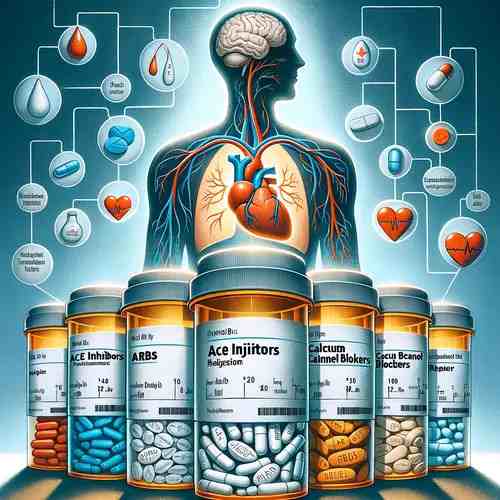Navigating the World of Hypertension Drugs: A Comprehensive Guide
Hypertension, or high blood pressure, is a condition that, if left unmanaged, can lead to serious health complications such as heart disease, stroke, and kidney failure. While lifestyle changes are the cornerstone of hypertension management, many individuals may also require medication to control their blood pressure effectively. This blog post provides a comprehensive overview of the various classes of hypertension drugs, their mechanisms of action, and considerations for their use.

Understanding Blood Pressure Medications
Blood pressure medications work in different ways to lower blood pressure. The choice of medication, or combination of medications, depends on the individual’s health profile, the severity of hypertension, and the presence of other medical conditions. Here’s a look at the main classes of hypertension drugs:
- Diuretics (Water Pills): These medications help the kidneys remove excess sodium and water from the body, which helps to lower blood pressure. Common diuretics include thiazides, loop diuretics, and potassium-sparing diuretics.
- Angiotensin-Converting Enzyme (ACE) Inhibitors: ACE inhibitors reduce the body’s production of angiotensin II, a substance that narrows blood vessels. By relaxing blood vessels, these drugs help reduce blood pressure. Examples include lisinopril and enalapril.
- Angiotensin II Receptor Blockers (ARBs): Similar to ACE inhibitors, ARBs block the action of angiotensin II, allowing blood vessels to relax and widen. Examples include losartan and valsartan.
- Calcium Channel Blockers: These drugs prevent calcium from entering the cells of the heart and blood vessel walls, leading to more relaxed and dilated blood vessels. Amlodipine and diltiazem are examples of calcium channel blockers.
- Beta-Blockers: Beta-blockers reduce the heart rate and the heart’s output of blood, which lowers blood pressure. They are often used in combination with other blood pressure medications. Examples include metoprolol and atenolol.
- Renin Inhibitors: A relatively new class of blood pressure medication, renin inhibitors slow down the production of renin, an enzyme the kidneys produce that starts a chain of chemical steps that increases blood pressure. Aliskiren is an example of a renin inhibitor.
Choosing the Right Medication
The choice of hypertension medication is influenced by several factors, including:
- Patient’s Overall Health: Existing health conditions such as diabetes, heart disease, or kidney problems can guide the choice of medication.
- Side Effects: Each class of medication comes with its own set of potential side effects. Patients should discuss these with their healthcare provider to choose the most suitable option.
- Age and Race: Research has shown that some blood pressure medications work better in certain populations. For example, ACE inhibitors and ARBs might be more effective in white patients, whereas African American patients might respond better to diuretics and calcium channel blockers.
- Cost and Lifestyle: The cost of medication and the patient’s lifestyle can also influence the choice of drug. Some drugs may require multiple daily doses, while others are taken once daily.
Medication Adherence
For hypertension medications to be effective, it’s crucial for patients to take them as prescribed. Non-adherence can lead to uncontrolled blood pressure and an increased risk of complications. Patients should communicate openly with their healthcare providers about any side effects or concerns to find the most suitable medication regimen.
Conclusion
Managing hypertension often requires a combination of lifestyle changes and medication. Understanding the different classes of hypertension drugs, their effects, and how they fit into your overall health plan is vital for effectively controlling blood pressure. Regular consultations with healthcare professionals ensure that the medication regimen remains optimal for each individual’s unique health needs, leading to better long-term outcomes and a healthier life.
